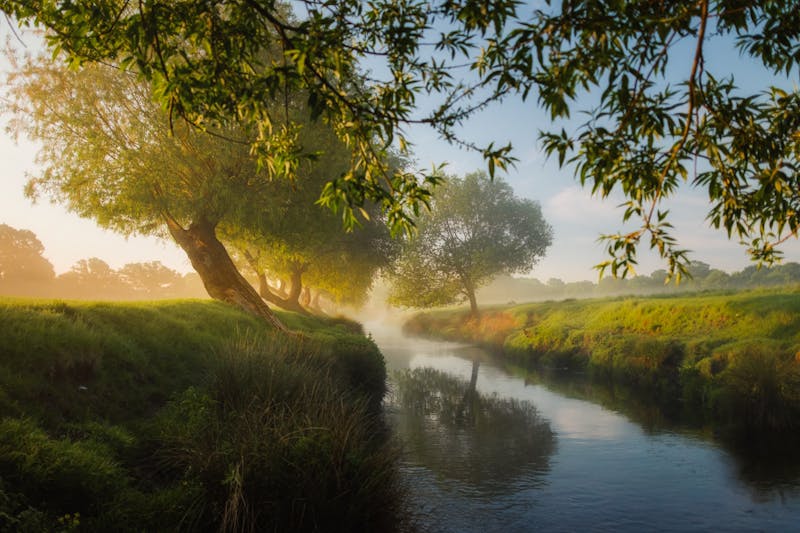

OPINION: World Earth Day shouldn’t be about trite environmental sentiments, but a true call to awaken our lost connection with nature.
Are you ready for World Earth Day on April 22? A popularised event where brands jostle for position to feed us their latest eco credentials and showcase how they are best aligned to World Earth Day’s mission of positive action for our planet.
We’ll hear of upgraded eco-friendly supply chains, of new biodegradable packaging, of products made from entirely recycled materials. We’ll hear of mandatory tree planting, of planetary donations and carbon offsets. We’ll hear of net zero energy consumption, reduced wastage, and plastic-free goods.
The messages will echo from the roof tops - from fashion to food, travel to technology, aerospace to agriculture. Why? Because consumers are lapping it up. Buying a product like this might not be higher quality or cheaper, but somewhere deep down within us it makes us feel better.
And why wouldn’t it? As Edward Wilson hypothesised all those years ago, a “biophilic” and innate love of nature exists in us all. Buying something with environmental credentials feels almost altruistic, and feeds a deep down affinity we have towards nature.
But taking surface level actions to remedy the damage already inflicted does little to address how and why our environmental crises started in the first place.
At some point in history, we stopped living in equilibrium with the natural world, and instead saw it as a resource to exploit.
If we’re to truly restore our planet - the theme of this year’s World Earth Day - we need nature to connect with all people, and not just a minority. The solution is not just practical, it’s emotional. People need to feel and value that connection with our planet, and only then will they take better environmental decisions - without even realising it.
In a world connected with nature, brands’ environmental credentials become hygiene factors and un-newsworthy. A future World Earth Day would not involve brands circling to exploit environmentally minded consumers, but be a day to truly celebrate our deep connection with the natural world.
On first glance, the pandemic has disconnected us from nature even more. We’ve been locked in our homes, limited to leaving the house perhaps just once a day, if at all. Many of us don’t have much outdoor space, while urban dwellers may have minimal proximity to greenery and the countryside. We’re emerging from the depths of winter, with border controls in place preventing foreign travel and holidays. It’s harder than ever to get our ‘nature fix’.
Yet, look a little closer and perhaps our connection has strengthened. We’ve a newfound appreciation for nature. We’ve championed our 1 walk a day, and truly valued its role in our wellbeing. We reacted to the confines of lockdown by planting seeds, growing vegetables and taking up gardening. We’ve finally slowed down, and started taking a moment to listen to nature’s sounds around us, or observed the seasonal changes to a once unloved shrub. We’ve dreamt of wild places, and we’ve sought escapism through nature.
Pre-pandemic, we had the opportunity to indulge in nature wherever and whenever we liked. Now, it’s a case of not knowing what we had until it’s gone.
We mustn’t lose this forward momentum in reconnecting with our natural world. A human race connected with nature is a human race that takes positive environmental decisions - without even realising it. These choices that favour the environment can become second nature.
This emerging symbiotic relationship between nature and our wellbeing is the real winner from the pandemic. It’s a trend towards ‘Environmental Wellbeing’ where we recognise the role natural surroundings play not just on improving our wellbeing, but our own behaviour towards the environment too.
The past 12 months have shown that if we find a seamless way for nature to fit into our daily lives, and we feel immediate benefits from it, we’ll seek it out more.
In fact, this doesn’t even need to be physical - virtual experiences of nature can have a comparable impact, and are much more accessible. They can fit into people’s daily lives, like aiding wake-ups, supporting work, or helping us drift off at night, and be used in indoor environments previously devoid of nature.
These experiences are a key focus of Alex Smalley, leader of the Virtual Nature project. He’s looking specifically at how digital experiences of the natural world can impact health and wellbeing. He described how virtual nature is no longer viewed as “a poor surrogate for the real thing” but as “a therapeutic tool in it’s own right”.
“The power of digital nature allows us to immerse people in any kind of environment. We may be able to tailor these experiences based on board preferences for certain conditions, or develop stimuli designed to target specific mental states”.
In other words, we can go so much further than just bringing nature experiences indoors. These experiences can be specifically linked to our requirements, such as to alleviate stress, help focus or sleep.
When we focus too much on our environmental crises we fail to see that the real goal is for nature to renew itself. Restoration is allowing nature to be in equilibrium once more with humanity, not us having dominion over it for our own unending gratification.
Nature is slow and it moves in cycles. It’s the frenetic pace of our modern world that fuels the imbalance, so in order to restore our connection to nature we need to be more mindful and respectful of it’s qualities.
World Earth Day, then, should be a focus on environmental actions, yes - but also about understanding and learning about nature’s role in our lives, and how harnessing it in the right way has unrivaled benefits to our own health, but also the planet.
After all, nature has been shown to have a restorative effect on us, so it’s about time we succumbed to our own altruistic tendencies and returned the favour.
Brands are led by what their customers want and believe. The messaging we’ll see around World Earth Day this year is testament to a changing customer base who are increasingly valuing nature and wanting to protect and restore it. This is a hugely positive change.
But let’s not forget the real challenge. Protecting and restoring our planet will only succeed if we have more people on board this journey who truly appreciate and feel connected with nature. This comes from increased nature experience - not just physically, but bringing nature into our indoor environments too.
Restoring our planet means restoring our connection with it. That’s when we’ll see real change.
Portal brings nature into your surroundings through cinematic visuals, 3D audio and smart light integration.
Explore The ExperienceUltra high def visuals, Dynamic Spatial Audio, smart light integration, award winning design and a strong stance on privacy.
Discover Our DifferenceWe take our inspiration from nature itself. Not just in recreating it, but in the entire way we run our business.
Read Our Story